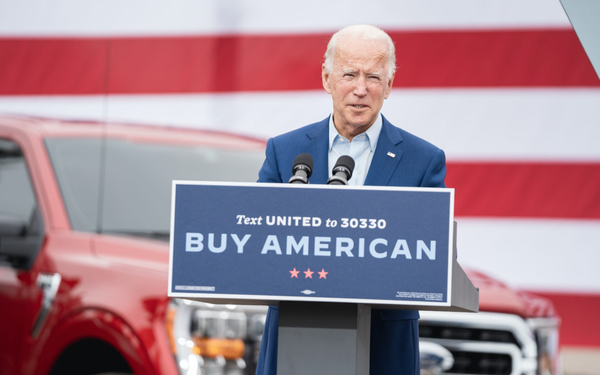Commentary
Study Finds Democratic Voters More Likely To Buy Foreign Auto Brands
- by Tanya Gazdik , Staff Writer, September 21, 2020

Photo Credit: United Auto Workers
As the 2020 election quickly approaches, it’s important for political marketers to understand all that they can about voters.
Looking at key differences between Democrats and Republicans, a study from data solutions company Lotame found that Democrats are more likely to buy foreign auto brands while Republicans are more likely to buy domestic. Specifically, Democrats are more inclined to purchase Subarus and Hondas while Republicans lean towards Buicks and Fords.
First, while it’s interesting, I’m not sure about the validity of this data. I’m used to seeing the number of people surveyed, the dates they were surveyed, how they were surveyed and the margin of error.
Lotame simply states: “The data was sourced from Lotame Panorama, a suite of data enrichment solutions that use first-, second- and third-party data to create and analyze addressable audiences across the cookie-challenged web, mobile app, and OTT environments. The Republican and Democratic profiles are defined by 190 million state and county registered voter files.”
Lotame found registered Democrats’ top indexing brands include Subaru, Honda, Nissan, Lexus, Mini, Hyundai, BMW, Toyota and Acura.
Conversely, registered Republicans are more likely to be in the market for domestic car brands. Top indexing brands include Buick, Ford, GMC, Lincoln, Dodge, Cadillac, Chevrolet and Jeep.
My first reaction to the data is that no one from metropolitan Detroit was surveyed. The vast majority of United Auto Workers members, who work for Ford Motor Co., General Motors and Fiat Chrysler Automobiles, vote Democratic and drive vehicles from the companies they work for, as do their families. The UAW endorsed Joe Biden back in April.
During Biden’s recent election stops in Michigan, he stood behind a podium with the placard that read “Buy American.” It might have been lip service given his location, but the candidate does drive a General Motors product, a Chevrolet Corvette, while Trump is driven around in the White House limousine, a GM-built Cadillac nicknamed “The Beast.” Trump owns a collection of luxury and performance cars, including a 2003 Mercedes-Benz SLR McLaren, a 1956 Rolls-Royce Silver Cloud, a Tesla Roadster and a 2011 Chevrolet Camaro Indy 500 pace car, according to AutoBlog.
I took a short road trip this weekend from Detroit to Sandusky, Ohio and traveled through the farmlands of northwestern Ohio (where many folks drive Jeeps because of their connection to the nearby Toledo Jeep plant.) Another hugely influential union, the International Brotherhood of Electrical Workers endorsed Biden even earlier, back in February, and I saw yard sign after yard sign proclaiming IBEW for Biden.
On backroads from Toledo to Sandusky, I counted 29 yard signs for President Trump and 25 for Biden. So Ohio could be as close as the pollsters are predicting. Despite being in a union, it's not a given that IBEW members drive U.S. Big Three vehicles.
Hondas are quite popular in Ohio outside of Toledo since the automaker has two manufacturing plants and an engine plant there. According to Insurify as well as Kelley Blue Book, the Honda Civic is the best-selling vehicle in the state.
Yet Ohio was a red state in the last presidential election, choosing Donald Trump by a margin of 8.13 points, which again would contradict the Lotame findings.
Bottom line, while there could be some correlation between political affiliations and brand preferences, it’s not definitive. Clearly a lot of other factors are at play, especial when it comes to such a major purchase as a vehicle.




Interesting and important insights - thanks Tanya.
For some time now, it has been evident that younger adults---especially women---are more likely to buy Japanese cars, in particular, for a variety of reasons ( price, size, style, fuel efficiency, etc. ), while older adults, especially men, favor American makes. Just check out the latest MRI data on this as well as other sources and directionally, I believe it still holds true. Therefore, no matter what the study's specs are---how it was dione, sample size, etc., which are always important to take note of, it's not surprising that registered Dems seem to favor imported cars while their GOP counterparts go for what Detroit is still putting out.Why? Because younger adults are more likely to be Democrats while older adults lean more to the Republicans. I doubt whether this has much to do with deeper meanings, political ideology, etc. , however.